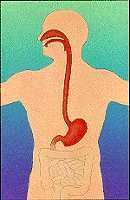 Ischemic colitis, a condition shrouded in medical intricacy, affects the colon and presents a unique set of challenges for those grappling with its symptoms. In this comprehensive guide, we embark on a journey through the maze of ischemic colitis, unraveling its origins, deciphering its symptoms, and exploring effective management strategies. So, fasten your seatbelts as we delve into the perplexing world of ischemic colitis.
Ischemic colitis, a condition shrouded in medical intricacy, affects the colon and presents a unique set of challenges for those grappling with its symptoms. In this comprehensive guide, we embark on a journey through the maze of ischemic colitis, unraveling its origins, deciphering its symptoms, and exploring effective management strategies. So, fasten your seatbelts as we delve into the perplexing world of ischemic colitis.
Understanding Ischemic Colitis
-
Decoding Ischemic Colitis: A Vascular Conundrum
Ischemic colitis is a condition characterized by inflammation and injury to the colon resulting from inadequate blood supply. The intricate vascular network supplying the colon can become compromised, leading to ischemia and subsequent damage. Understanding the complex interplay between blood vessels and the colon is crucial in demystifying this condition.
-
Burstiness in Blood Flow: Unraveling the Causes
Ischemic colitis often stems from a sudden reduction in blood flow to the colon. A burst of factors can contribute to this, including blood clots, arterial embolisms, atherosclerosis, and low blood pressure. The burstiness in blood flow creates a precarious environment where the delicate balance between oxygen supply and demand is disrupted.
Symptoms and Diagnosis
-
Symptoms of Ischemic Colitis: Navigating the Warning Signs
The symptoms of ischemic colitis can vary in intensity and presentation. Patients may experience abdominal pain, often crampy in nature, accompanied by a sudden change in bowel habits. Blood in the stool and abdominal tenderness are also common indicators. Recognizing these symptoms promptly is vital for timely intervention.
-
Diagnostic Challenges: The Perplexity of Pinpointing Ischemic Colitis
Diagnosing ischemic colitis requires a multifaceted approach. The clinical presentation may mimic other gastrointestinal conditions, adding a layer of perplexity. Imaging studies, colonoscopy, and blood tests play pivotal roles in confirming the diagnosis. It's a delicate balance to distinguish ischemic colitis from other potential causes of abdominal pain.
Risk Factors and Prevention
-
Unraveling Risk Factors: A Burst of Vulnerability
Certain factors predispose individuals to ischemic colitis, creating a burst of vulnerability. Advanced age, a history of vascular diseases, and conditions affecting blood clotting increase the risk. Understanding these risk factors is essential for preventive measures and early detection.
-
Preventive Strategies: Bursting the Bubble of Ischemic Colitis
While some risk factors are beyond control, lifestyle modifications can contribute to prevention. Managing underlying conditions such as diabetes and hypertension, maintaining a healthy diet, and staying physically active form the cornerstone of preventive strategies.
Management Approaches
-
Navigating Treatment Options: Bursting Through the Challenges
The management of ischemic colitis involves a burst of strategies aimed at addressing the underlying cause and alleviating symptoms. In mild cases, conservative measures such as bowel rest and intravenous fluids may suffice. Severe cases may necessitate surgery to remove damaged portions of the colon.
-
The Burst of Innovation: Emerging Treatments
Ongoing research is exploring innovative treatments for ischemic colitis, including the use of hyperbaric oxygen therapy and stem cell-based therapies. These bursts of innovation hold promise for improving outcomes and expanding treatment options.
Conclusion
In conclusion, ischemic colitis stands as a condition marked by its vascular complexity and a burst of symptoms that demand prompt attention. Navigating this medical maze requires a thorough understanding of its origins, recognition of symptoms, and a burst of strategies for effective management. As we continue to burst through barriers in medical research, the future holds promise for improved diagnostic tools and innovative treatments, offering hope to those grappling with the challenges of ischemic colitis.
Disclaimer:
The information on this website is provided for educational and information purposes only and is not medical advice. Always consult with a licensed medical provider and follow their recommendations regardless of what you read on this website. If you think you are having a medical emergency, dial 911 or go to the nearest emergency room. Links to other third-party websites are provided for your convenience only. If you decide to access any of the third-party websites, you do so entirely at your own risk and subject to the terms of use for those websites. Neither Arnon Lambroza, M.D., P.C., nor any contributor to this website, makes any representation, express or implied, regarding the information provided on this website or any information you may access on a third-party website using a link. Use of this website does not establish a doctor-patient relationship. If you would like to request an appointment with a health care provider, please call our office at 212-517-7570.


